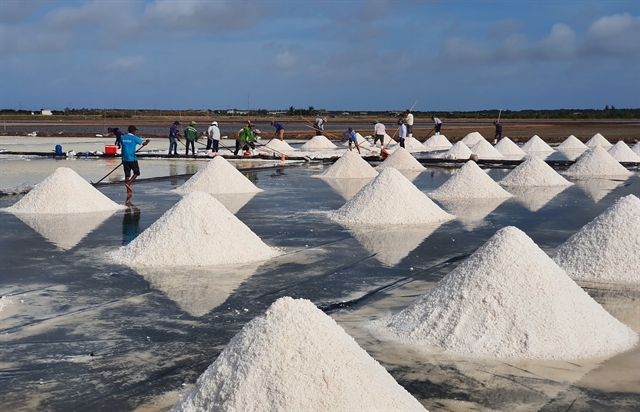 Society
Society

 |
| Salt is produced using plastic sheets to cover the field beds in Bạc Liêu Province. – VNA/VNS Photo Tuấn Kiệt |
BẠC LIÊU – Bạc Liêu Province is seeking to develop salt production on an industrial scale and improve producers’ incomes.
The Cửu Long (Mekong) Delta’s largest salt producing province has been at it for more than 100 years and its products are well known for their high quality.
Bạc Liêu salt was granted geographical indication by the National Office of Intellectual Property in 2013 and the “craft” was recognised as a national intangible cultural heritage in 2020.
The province has a coastline of 56km and favourable conditions for producing salt, and its production areas are mostly in Hoà Bình and Đông Hải districts.
But the total area has shrunk from more than 3,000ha in 2011 to 1,411ha this year because of low profits for producers.
Lê Minh Mẫn’s family has 9ha of land in Hoà Bình District and been making salt for two generations.
This year, however, he is farming black tiger shrimp on 4ha because of the higher income from it, he said.
“Other salt farmers switched to other crops with higher profits and I am the only one [still making salt here]. So I had to switch too.”
But he keeps making salt on the remaining 5ha because he wants to preserve his family’s traditional craft.
In Đông Hải District, more and more farmers are rotating between extensive shrimp farming in the rainy season and salt production in the dry season on their fields.
Nguyễn Hoàng Quốc, chairman of the Huy Điền Salt Producing Co-operative in the district’s Điền Hải Commune, said: “Extensive shrimp farming does not require high investment costs, and it has high economic efficiency.”
The use of plastic sheets to cover salt field beds to produce cleaner salt offers high yields and higher prices, according to local authorities.
Yet most farmers continue to use traditional methods since they lack the money to invest in advanced techniques.
Linkages have been developed between farmers and companies but are not sustainable, and this has led to low economic efficiency.
Lê Tấn Cận, Deputy Chairman of the province People’s Committee, said the aim is to preserve the traditional salt production craft.
The province is implementing a project to increase the value of salt production this decade, he said.
It is working towards increased efficiency and sustainability to meet the requirements of the domestic and export markets, create jobs and improve farmers’ incomes, he said.
The province has focused on producing salt-related products for export to improve value, he said.
There are two salt processing plants in the province with a total capacity of 36,000 tonnes a year that process around 10 per cent of the province’s production.
Its high-quality salt products are exported to Japan and South Korea among many other countries.
Under the country’s “One Commune-One Product” (OCOP) programme, it has 10 salt-related products recognised as OCOP products ranked three- or four-star, with the highest under the programme being five stars.
The Bạc Liêu Salt Joint Stock Company accounts for the seven four-star products (refined salt, shrimp salt, vegetarian salt, coarse salt, iodised salt, red chilli salt, and black pepper salt), and the Đông Hải Salt Joint Stock Company makes clean coarse salt, dried clean coarse salt and dried refined salt.
Development
To enable the province to develop salt production on an industrial scale, the Ministry of Agriculture and Rural Development is helping implement a project to upgrade infrastructure in Đông Hải District in 2021-25.
The VNĐ100-billion (US$4 million) project will see the construction of 15 km of new roads and rebuilding of four bridges to salt producing areas in Điền Hải and Long Điền communes.
The province will strengthen measures to improve yields and quality by applying advanced techniques and mechanising production of salt and salt-related products.
It plans to develop tourism services that enable visitors to participate in salt making, make souvenirs and medicinal products from salt and organise an annual salt festival.
Lưu Hoàng Ly, director of the Department of Agriculture and Rural Development, said with the implementation of these measures salt production would develop and farmers would feel secure.
The department would also prioritise production of clean and high-quality salt for exports, he added. – VNS




